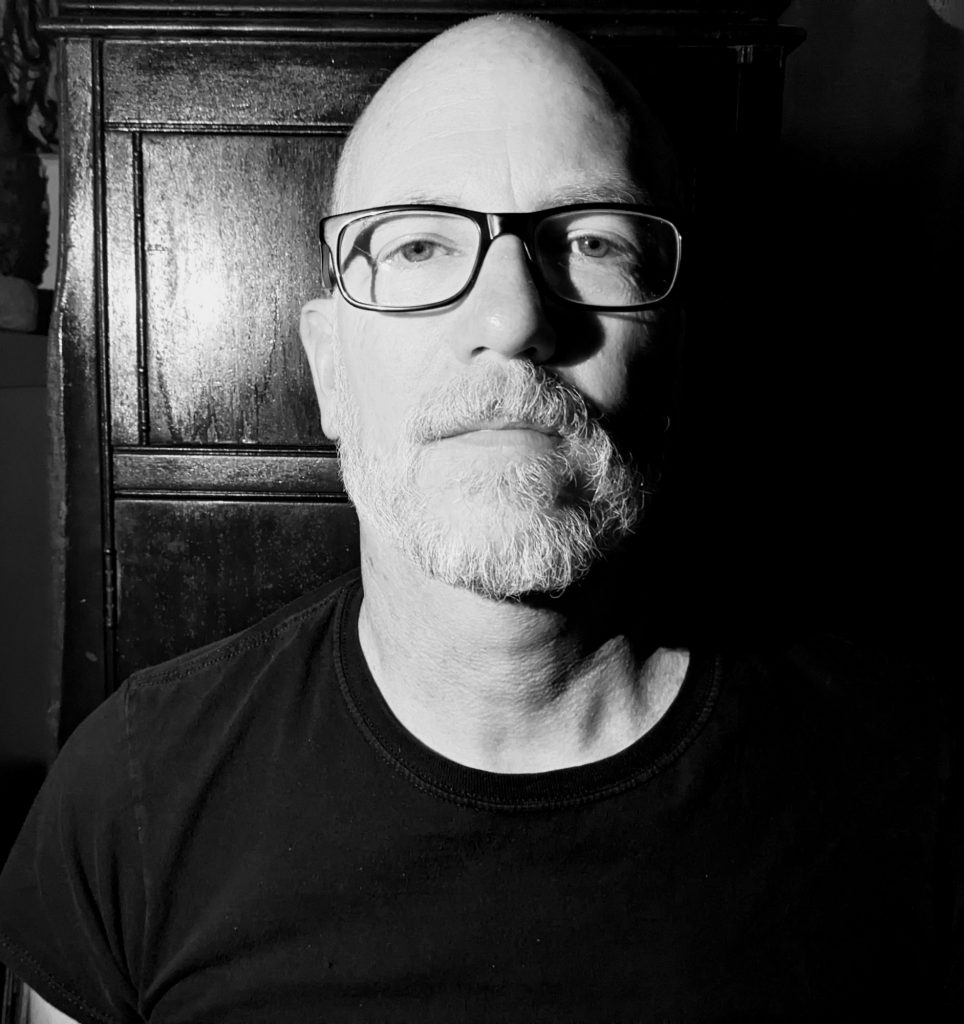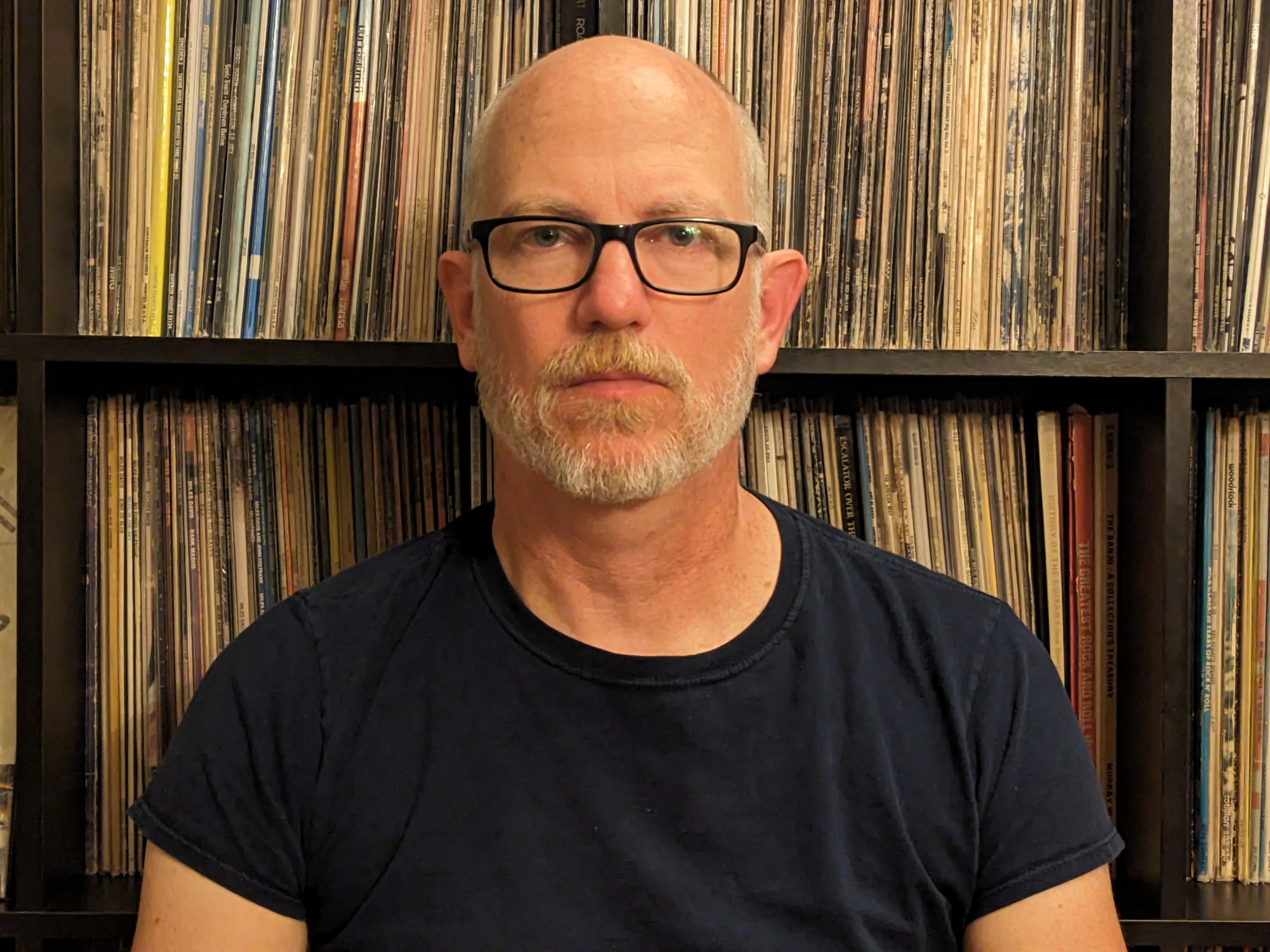Since he was a teenager, the Illinois drummer Blake Fleming has distinguished himself with his idiosyncratic and highly-coveted drumming style, which is his trademark. At fifteen, he formed the math rock band Dazzling Killmen, whose short career and Steve Albini-engineered second record left a revered dent in the Chicago independent music scene.
After they split, Blake toured with the Japanese noise rock band Zeni Geva on their North American tour in 1995. Soon after, he moved to New York and formed Laddio Bolocko, an experimental instrumental project that enjoyed local success, before meeting Cedric Bixler-Zavala and Omar Rodríguez-López of the then-highly successful post-hardcore band At the Drive-In.
Cedric and Omar, who were growing tired of the limitations of that project, sought new pastures and were impressed not only by Blake’s drumming style but also his lack of awe for their other project. Blake flew out to L.A. and laid down some beats on the early demos for what would become the also highly successful The Mars Volta.
Looking back at his career condensed like that, it seems that since the Dazzling Killmen’s formation in 1990, Blake was constantly thrown from project to project without time for reprise. “It does feel about right because I was much younger during those times,” Blake says of that attrition now, when reflecting with Post-Burnout.
“You’re tied to nothing. Maybe I had a girlfriend, maybe, but that was it. And I lived for music, especially back then. I was way out of balance [Laughs], but in a really good way. It’s much easier to do in your twenties and thirties, and some people continue a lifetime of that. I’ve tried to become a little more balanced, but here I am, still trying to do it.”
After playing drums with The Mars Volta when they supported Red Hot Chili Peppers on the North American leg of their 2006 Stadium Arcadium World Tour, Blake began a more chilled-out life, primarily teaching drum lessons in New York City and filling in for session work with the likes of The Lemonheads, The Ropes, and Kim Taylor. Yet, after all that time working with other people, he yearned to craft a project which emphasised his skillsets at the forefront.
“Part of the reason I made my first solo record is I had a practice space, I had a little bit of recording equipment,” Blake says of what he did next. “It was very bare-bones, but I had some time and some space to start messing around and just recording ideas.
“And, at that point, post-all of the big three bands that I’m sort of known for – The Mars Volta, Dazzling Killmen, and Laddio Bolocko – after all of that, it wasn’t like I had quit playing with other people, but I took some time to figure out some stuff on my own, a little bit. What I wanted to do, musically. It was a lot easier to work on my own than to work with other people.”
In the early 2010s, Blake and his wife moved from New York City to the Catskill Mountains in Upstate New York for seclusion and serenity. Whilst there, Blake’s passion for creating a solo record – an idea that had been with him for a long time prior – kept intensifying.
“Part of it was logistics and a desire and, also, being in-between bigger projects, and, perhaps, at that time, residing up in the mountains and wanting to go for more of a simpler existence, and going on my own was serving that existence,” Blake says of his growing desire.
That desire’s seeds germinated into Blake’s debut album, Time’s Up, which explored percussion instrumentation as a means of instrumental storytelling. “Initially, I probably didn’t have the idea to start a record; I was just chasing ideas, you know?”, says Blake.
“And I would find things that worked and then I would build on to that. And then, after a while, kind of zooming out a little bit and getting a more macro view, I started to realise, ‘Oh. There’s something to this material, here. Perhaps I will cobble it into something like an album.’
“My son was going to be born in November 2012. I wanted to have the solo record done because my wife got pregnant, and I wanted to have that done and out, ideally, before that because I knew my life was going to get busy and change in some sort of way. No matter what I tried to do, life was coming for me! [Laughs]”
Time’s Up was released in January 2013, two months after the birth of Blake’s son. “I remember the day that the records came and got delivered to my house, he was there because we took pictures of him with the records!” laughs Blake.

Courtesy of Discipline PR
After realising his solo expression, Blake next sought to satisfy another curiosity. “Like I had always wanted to do a solo record, I had always wanted to write a book, also,” he says. “I just felt that there was something in there, so the book that I set out to write initially was not the book that became The Book of Rhythm.
“So, initially, I was going to write a very personal, ‘My Method: How I Got from A to Z,’ kind of thing. Like, ‘If you’re interested in my drumming and my drumming style, I’m going to give you all of the elements that helped create the style that I have,’ or something along those lines.
“It was going to be more that, with maybe sprinkles of autobiographical titbits in there. I might still do a book like that, that’s a bit of drumming and autobiography and kind of going into the background of not just the pattern and rhythms but what I did with them and why, and maybe, ‘Oh, you can hear it on…’ examples. I might still do that in the future.”
Instead, as Blake began to write, he became overtaken by exploring the possibilities, finite or infinite, of rhythms afforded by percussion instruments. The resulting book was 2018’s The Book of Rhythm, a beyond-meticulously thorough examination and study of the equations and history of rhythmic music.
When we asked if studying the material for the book changed Blake’s listening habits, he responded, “It didn’t change me as a listener, I wouldn’t say. It changed me as a musician, though, just in realising the possibilities. I don’t draw lines in the sand. I’ve always been open to, ‘Well, hey, I don’t know. Let’s try it.’
“The question ‘What if?’, when used in a creative way, is one of the greatest questions you can ever ask. Like, ‘Hey, what if? What if we tried this?’ Shit, man, anything goes. Anything goes. It opened me up in that way. It also allowed me to become even more organised because I had to organise that. There’s over 5,000 rhythms in order, in terms of how they progress in barlines, how they progress as a number of beats, and all that. It’s a mathematical order, the whole book.”
Blake admits that a lot of what generates his workflow is pressure from life itself. “In a way, it’s sort of like an existential malaise from the passing of time and the pressure that one can feel just from the passing of time, especially as I get older,” he says. “I’m going to be fifty-two this year, which is completely crazy to me.”
“I mean, I’m glad to be living to be ‘older,’ quote-unquote – I hope to be much older – but it’s also crazy to be fifty-two, at the same time, when I’m still – cliché – I’m like fifteen, sixteen, seventeen, eighteen, something like that, in my mind. But, yeah, the passing of time and the way that it speeds up as we get older definitely pushes me to want to put stuff out there more, you know?”
Since Time’s Up, Blake has continued to toil away at making solo material. In 2020, Blake released the EP Drum Killah, and, this August, released a succeeding album called The Beat Fantastic, which took the four tracks from Drum Killah, rearranged them, and added onto them.
“I really looked at it as one piece, one whole piece, and, of course, there’s these individual movements within that,” Blake says of The Beat Fantastic. “I love old movie soundtracks – and not just old movie soundtracks – but movies from the forties to the present, really. I love soundtracks, and the weirder the better, too. And I started getting in mind that I was writing the soundtrack to a movie that has never been made.
“And that’s nothing really new for me, I mean, we thought that way a lot when I was in Laddio Bolocko, because we were an all-instrumental band and our music always has just a natural cinematic quality to it, and that’s kind of what happens when I make my own music, as well, and part of it is because it’s instrumental, part of it is because I love soundtracks, and part of it is because I’m not telling a story with language, at least with a spoken language, in that way. I’m trying to tell a story with a musical language, you know?”
Despite his longevity and seniority, Blake is never satisfied with the extent of his knowledge and is constantly seeking education and experimentation. “Miles Davis, from the time that I was a little kid and got turned onto him, has been my all-time favourite musician,” Blake says.
“Just the breadth of his work and the depth and, oh, my God, just the innovation, and I just love Miles so much, and his bands and his records and all of that. And he was always looking forward. Always, always, you know? Always. Never wanting to settle. Never wanting to just be like, ‘Alright, I’m cool. I made it…’ fuck, he’s Miles Davis! He could’ve just stopped in the fuckin’ sixties and still been a fuckin’ legend, right?
“But then he goes onto the seventies, and we have all those records from ’70 to ’75, right? He’s junked out of his mind, but it’s amazing music. And then he comes back, and he’s doing Cyndi Lauper covers and shit, and Michael Jackson covers and stuff. I mean, he never stopped. He never stopped.
“And I’ve always tried to tell myself that that’s how I want to be, as well. It’s not always easy to be that way sometimes because, well, life is hard, and you get worn out. You get worn out. Sometimes, you just want to fuckin’ eat a burrito and watch TV or something and tune out, but I can’t do that for too long.
“So, I’m always trying to push forward because I’m a perpetual student. I have a son who’s coming on twelve, and I want to influence him in these ways, too. He’s an information monster! It’s beautiful! There’s always something to learn. There’s always something to notice.”
Blake Fleming’s latest record, The Beat Fantastic, was released physically last Tuesday. You can purchase all of Blake’s material, find his social media accounts, buy his book, book a drum lesson with him, and more on his website.
Tune into POSTBURNOUT.COM Interviews… tonight at 21:00 (IST) to hear this interview in full, where we go into further detail about everything discussed, as well as dive into why Blake will never put his solo material on Spotify, working with Steve Albini and what he learnt from him, the dread of social media and why he took a sabbatical, how being an independent artist has changed in his career, and much more. Available on YouTube, Spotify, Apple Podcasts, and Amazon Music Podcasts.

Aaron Kavanagh is the Founder and Editor-in-Chief of Post-Burnout. His writing can also be found in the Irish Daily Star, Buzz.ie, Totally Dublin, The GOO, Headstuff, New Noise Magazine, XS Noize, DSCVRD and more.

 POST-BURNOUT
POST-BURNOUT